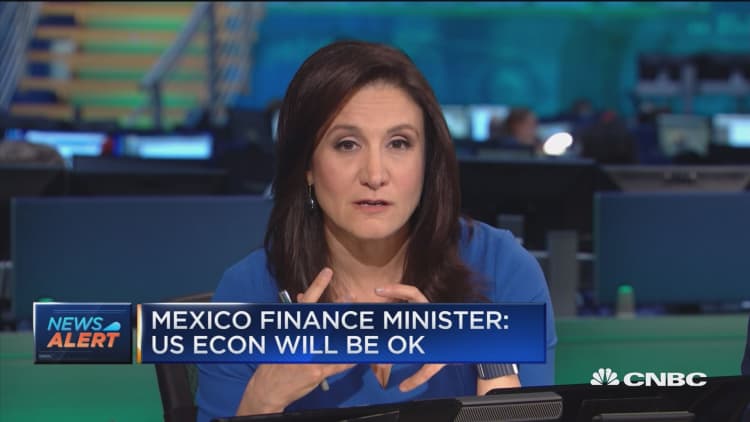Biting your nails about your investments in anticipation of the November presidential election? You're not alone, many financial advisors say.
"There are concerns and worries, and it's coming from both sides of the aisle," said certified financial planner Karen Altfest, principal advisor and executive vice president of client relations at Altfest Personal Wealth Management.
"Yes, it's a complicated world, but the people who have fears aren't focusing on things like stock valuations and economic indicators and trends that an investor should look at to make decisions," Altfest said. "They're focusing on their feelings about [unrelated] things."
Justified or not, presidential elections tend be accompanied by volatility in the stock market when no incumbent is running. Merrill Lynch research shows that since 1928, the has dropped an average 2.8 percent in presidential election years that don't include an incumbent seeking re-election. (The annual average since 1928 is a 7.5 percent gain.)
This year, with no incumbent running and two unpopular candidates likely to be on the ballot, financial advisors say they expect market volatility.
"Our opinion is that any reaction will be short-lived and ultimately will not change the fundamentals in our economy," said Howard Pressman, a CFP with Egan, Berger & Weiner. "We still remain cautiously optimistic."
Finance education website Investopedia has developed what it calls an Anxiety Index, which shows that, overall, investors are at a fairly neutral level of financial anxiety.
Basically, the index looks at a basket of anxiety-provoking search terms — such as "bankruptcy," "default" and "short-selling" — that spike on the site when investors are nervous.
Investopedia found that when its anxiety index spikes, within several months there is most often a shock to the market.
The U.S. is really still the economic engine that drives our globe, and that is going to continue no matter who occupies the White House.Howard Pressmancertified financial planner with Egan, Berger & Weiner
"Research and education often happen before people start taking action," said David Siegel, CEO of Investopedia.
At the end of May, the Anxiety Index stood at 102, a point lower than in April. By way of comparison, the index stood at 119 in January. At that point, it was far less clear which candidates would clinch their party's nomination.
Siegel said that over the last five election years, a high level in the anxiety index correlates with a voter mandate for a change in political leadership. A low level correlates with a mandate for the status quo.
So this year, if the index remains neutral or continues lower, Siegel said, chances are greater for a Clinton presidency, since the closest thing to a status quo would be another Democratic president.
If the index starts climbing, "a Trump presidency would become a far more likely reality," Siegel said.

The highest the index has gone is 175, which it hit in September 2008 just before the worst of the financial crisis. The S&P lost 37 percent that year.
For most investors, advisors say, the best way to weather any storm — whether caused by the upcoming presidential election or something else — is to keep your eye on the long term.
John Gugle, a CFP with Alpha Financial Advisors, said he helps worried clients by revisiting their financial plan with them. He focuses on their investment portfolio's diversification.
"Whether your strategy is growth or conservative or balanced, when you have broad diversification, if something goes down then something else will go up," Gugle said. "I remind them their portfolio is structured to withstand market fluctuations."
He also said he expects several factors outside of politics to be the biggest culprits in near-term volatility: interest rate uncertainty, global economic hot spots and troublesome company earnings.
We'll stay in somewhere, but we'll trim some positions for some clients. ... I think it's a good time to look at changes.Karen Altfestexecutive vice president of client relations at Altfest Personal Wealth Management
Gugle said that while he expects more volatility around the election, he doesn't think we need to worry too much about who is going to be president. "I really don't," he said. "In 2008, we had similar conversations with clients."
That year, he said, some clients were horrified enough by the prospect of then first-term Sen. Barack Obama running the country to move their investments to cash despite Gugle's efforts to dissuade them.
"They came back to the market eventually, but they missed the rebound in 2009," he said.
Altfest said that with many of her clients overweighted in large-cap stocks and the uncertainty surrounding how the market will react as the Nov. 8 election approaches, her firm is planning to reduce its position in U.S. large-cap stocks.
"We'll stay in somewhere, but we'll trim some positions for some clients," Altfest said. "I think it's a good time to look at changes."
At the same time, however, her firm is looking to increase exposure in some client portfolios to emerging markets, China and alternative investments.
Her advice to investors at large is to have a well-diversified portfolio that can absorb market shocks.
Pressman, meanwhile, basically tells clients that the election is just noise.
"We tell our clients that the decisions we make will be driven by two things: those internal to their world and those that impact our economy," Pressman said. "Unless there are changes in the economy — fundamentals and signs that signal to us an economic recession on the horizon — we're likely not to make any changes in our portfolios.
"The U.S. is really still the economic engine that drives our globe, and that is going to continue no matter who occupies the White House."

